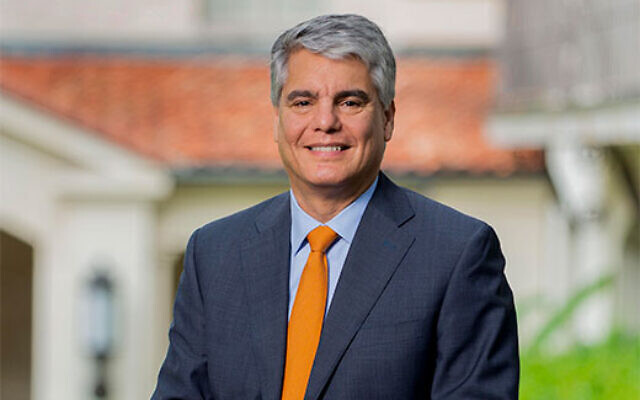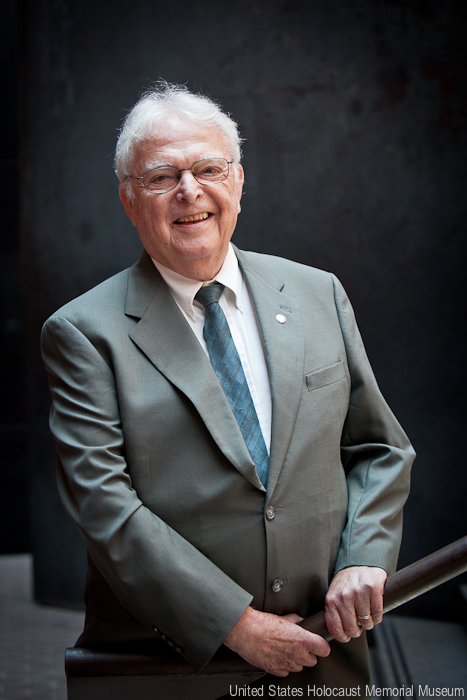New Emory President the Son of Holocaust Survivor
Believed to have been the first Jewish president at the University of Texas-Austin, Gregory Fenves reportedly would hold the same distinction at Emory University.
Dave Schechter is a veteran journalist whose career includes writing and producing reports from Israel and elsewhere in the Middle East.

Gregory Fenves was president of the University of Texas-Austin when he received the “Guardian of the Human Spirit” award from the Holocaust Museum Houston in November 2017 and spoke about hatred.
“We are living through a time when our nation is experiencing acts — even movements — fueled by hatred, racism, anti-Semitism, anti-Muslim and anti-gay sentiments, and discrimination towards immigrants on college campuses and in our communities. We must denounce these negative forces. They are inhumane and simply un-American. Too many people do not understand what hatred can lead to — especially organized, legitimized hatred,” said Fenves, who on Aug. 1 becomes the 21st president of Emory University.
Fenves, believed to have been the first Jewish president of UT-Austin, reportedly would hold the same distinction as the first Jewish president at Emory.
In that Houston speech, Fenves recalled that he was about 8 years old when he came home from Hebrew school one Sunday and told his mother that his teacher had mentioned the Holocaust.
Norma Fenves told her son something he did not know, that Steven Joseph Fenves, her husband and Gregory’s father, was a Holocaust survivor.
Steven was napping in a bedroom when Gregory looked in and noticed the number tattooed on his father’s arm. “Seeing that tattooed number for the first time is something I will never forget,” Fenves said.
The elder Fenves wrote about his Holocaust experience in a book titled “Resist is Everything” and has told his story at the United States Holocaust Memorial Museum.
Steven “Joska” Fenves grew up in Subotica, Yugoslavia, a city of 100,000, including 6,000 Jews. When the Axis powers invaded Yugoslavia on April 1941, Subotica came under Hungarian rule. His father’s printing business was taken away and given to a non-Jew, part of a policy of “Aryanization.” Three years later, as the Germans occupied Hungary, first his father, and then Steven, his sister, mother and maternal grandmother were sent to Auschwitz.
At age 13, Steven survived five months at Auschwitz, using his language skills to serve as a translator among prisoners of various nationalities. He was smuggled to a sub-camp of Buchenwald, where he worked in an airplane manufacturing plant and survived a death march to Buchenwald itself, arriving on April 10, 1945. The U.S. Army’s 6th Armored Division liberated Buchenwald the next day.

After the war, Fenves returned to Yugoslavia. His mother had died at Auschwitz and his father died a year after the war. He fled with his sister (who had survived Bergen-Belsen) to Paris and then America, to Chicago. Fenves served in the U.S. Army and used the G.I. Bill to study engineering at the University of Illinois-Champaign. In time he became a renowned engineering professor at the University of Illinois and Carnegie Mellon University. He and his wife, Norma Horwitz Fenves, a social worker, raised four children, Gregory being the oldest.
Gregory Fenves followed in his father’s academic footsteps. He comes to Emory after a dozen years at UT-Austin, during which he served as dean of the Cockrell School of Engineering, provost, and executive vice president, before becoming president of the university in 2015. He earned a bachelor’s degree from Cornell University and a master’s degree and doctorate from the University of California-Berkeley, all in civil engineering. Fenves began his teaching career in 1984 as an assistant professor at UT-Austin, before spending 20 years at the University of California-Berkeley, where he chaired the department of civil and environmental engineering, developing a reputation as an expert on structural engineering to counter earthquakes. Fenves returned to UT-Austin in 2008.
At Emory, the 63-year-old Fenves succeeds Claire Sterk, who will return to teaching after four years as president.
Emory has an enrollment of about 15,000 students, of whom Hillel International estimates that 16 percent of the undergraduates and 9 percent of the grad students are Jewish.
In April 2019, the campus was embroiled in controversy when pro-Palestinian students posted mock eviction notices on dormitory doors and at an off-campus residence as part of Israel Apartheid Week, which coincided with Emory Israel Week. The flyers warned that the premises were scheduled for demolition in three days. A disclaimer at the bottom advised that the notices were not real but “intended to draw attention to the reality that Palestinians confront on a regular basis.” The flyers were ordered removed for violating university policy on posting notices. A committee of the university senate concluded that, aside from the improper posting, “the rest of the flyer is fully protected political speech under the Open Expression Policy.”
Emory’s announcement of Fenves’ hiring included the following: “Fenves has made diversity and inclusion a priority, successfully leading UT Austin to the U.S. Supreme Court to defend the educational benefits of diversity in higher education in the landmark Fisher case. And he has been deeply engaged with UT Austin students throughout his presidency.”
Fenves’ engagement with students included Chanukah in December 2015, when he became the first UT president to light a menorah on the Austin campus with the Rohr Chabad Jewish Student Center.
“One part of the education at the university is learning not only about your community and learning it more deeply, but about others,” Fenves told that gathering, according to the Jewish Herald-Voice of Houston. “And, one of my communities that I’m very proud to be a member of in Austin is the Austin Jewish community. So, I’m real proud to be here as president of the university to represent the university, but also to be part of a community that’s celebrating and enjoying Chanukah.”
Fenves’ history of engagement with the UT-Austin community, along with his record as an administrator and an academic, attracted Emory to him.
“We are tremendously excited about the appointment of Greg Fenves, a world-class educator and brilliant leader,” Bob Goddard, chair of Emory’s board of trustees and of the Presidential Selection Committee, said in a statement. “We wanted someone with deep experience leading a major research university and a stellar record of scholarship. We also sought an inspirational leader and a person of impeccable character. Greg Fenves embodies all that we hoped to find.”
For now, Fenves remains in Austin, overseeing that university’s response to the COVID-19 pandemic. “The timing of this news in the middle of the COVID-19 pandemic is not what I had expected or wanted,” he wrote in an email to the UT community. “Our dedicated faculty and staff have striven to make the spring 2020 semester meaningful for our students. I want you to understand that I remain singularly focused on continuing that work, completing the semester and getting our community back to normal before my presidency ends on June 30.”
Ironically, on March 13, Fenves wrote to the UT community that his wife, Carmel Martinez Fenves, had tested positive for COVID-19 after a trip they made to New York City. Fenves and two other family members went into self-isolation.
A first-generation college graduate herself (from the University of California-Davis), Carmel Martinez Fenves actively engaged with first-generation students at UT. She is a textile artist, and formerly a partner in an Austin home furnishing business that she co-founded. She and her husband have two adult daughters, a son-in-law and a granddaughter — all of whom live in Austin.



comments